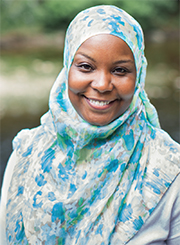Class of 2011
University of Pennsylvania Interfaith Fellow for Spirituality, Wellness and Social Justice
Nonprofit Founder & President
Philadelphia, Pennsylvania
Kameelah Rashad is working to bridge differences between people of diverse cultures as the Interfaith Fellow for Spirituality, Wellness and Social Justice at the University of Pennsylvania.
Her work includes fostering the emotional and spiritual well-being of students of all faiths. She also offers mental health education as the Founder and President of the nonprofit Muslim Wellness Foundation.
How do you show empathy to people who are in pain?
Kameelah doesn't hesitate to tackle the challenges she faces working with the diverse population she serves. She gained expertise in this work at the IIRP. "I appreciated the language around healing harm," she explains. "How do you show empathy to people who are in pain? How do you reflect on how to make things right?" She employs techniques such as compassionate witnessing, narrative therapy and restorative questions to empower people to express their feelings, tell their stories and reflect on their responsibility when harm is caused.
Everyone can do something.
Kameelah is providing crucial support to Sudanese refugee students. These young men journeyed to America to escape a horrific civil war and appalling living conditions. In response, she's helping them work through the terror and confusion of their traumatic pasts and uncertain futures here in the U.S. With her assistance, they are building a healthy support network and transforming their feelings of powerlessness into resilience.
"This work always includes letting people tell the story of who they are, showing empathy and repairing harm," Kameelah notes: skills she learned at the IIRP. "I just pray that in these challenging times, everyone will do what they can according to their own ability. Everyone can do something."
I've empowered her to make the world a better place.
Islamophobia and prejudice have also impacted Kameelah's family. In school, a boy asked her 14-year-old daughter, "Isn't your mom in ISIS?" Instead of correcting him, the teacher scolded her daughter for raising her voice. She was devastated. Kameelah met with the school principal, addressing the matter as a school climate issue. "Teachers need to be aware of the way they communicate with students. Like the IIRP, we need to provide a space for students to feel safe enough to express their concerns," she maintains.
Kameelah's daughter knows about the work her mother does. She wants to be a lawyer so she can protect children from injustice. "I can't shield her from what's going on around her," she concludes. "As a parent, I believe I've empowered her with an awareness and a sense of agency to want to make the world a better place."

